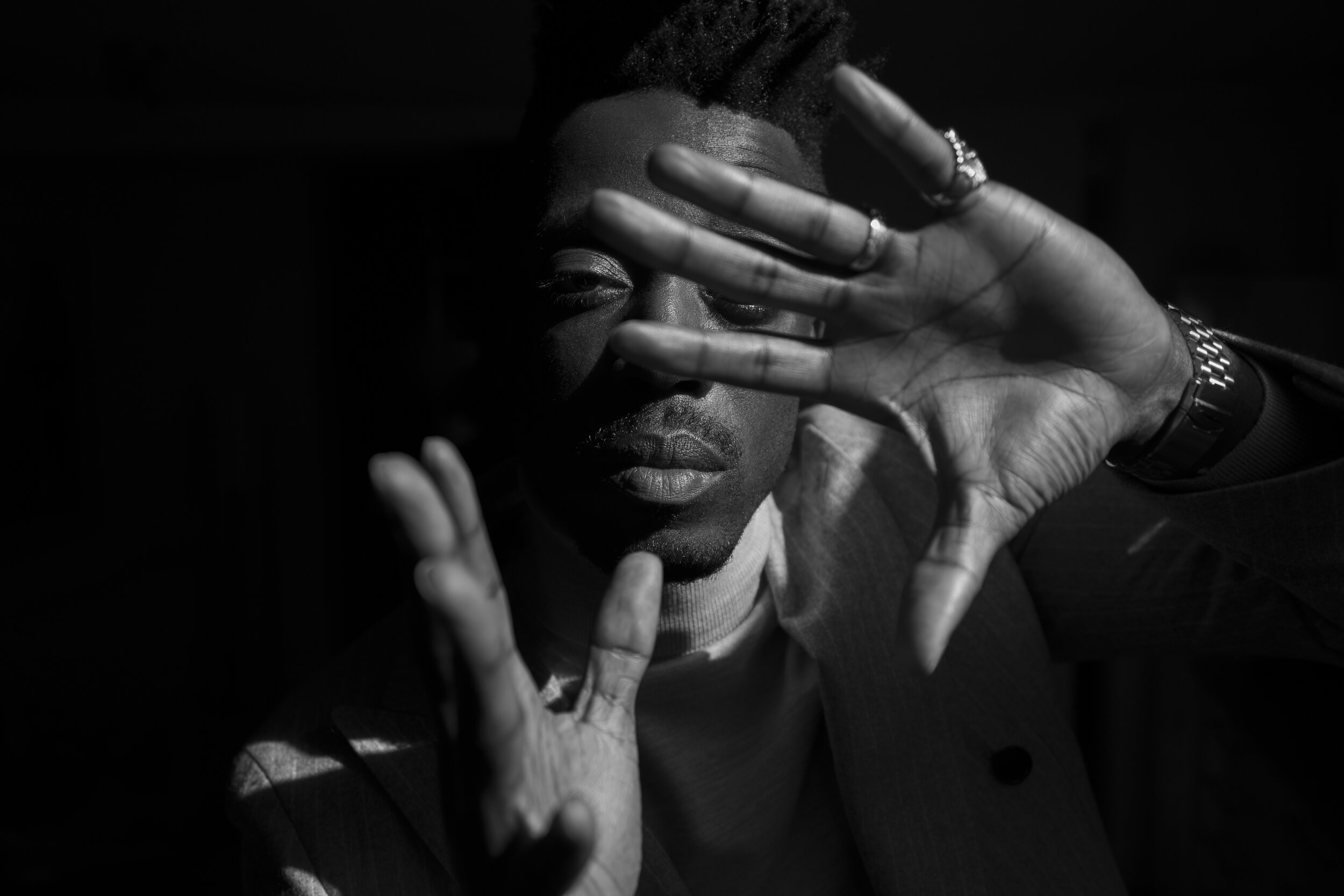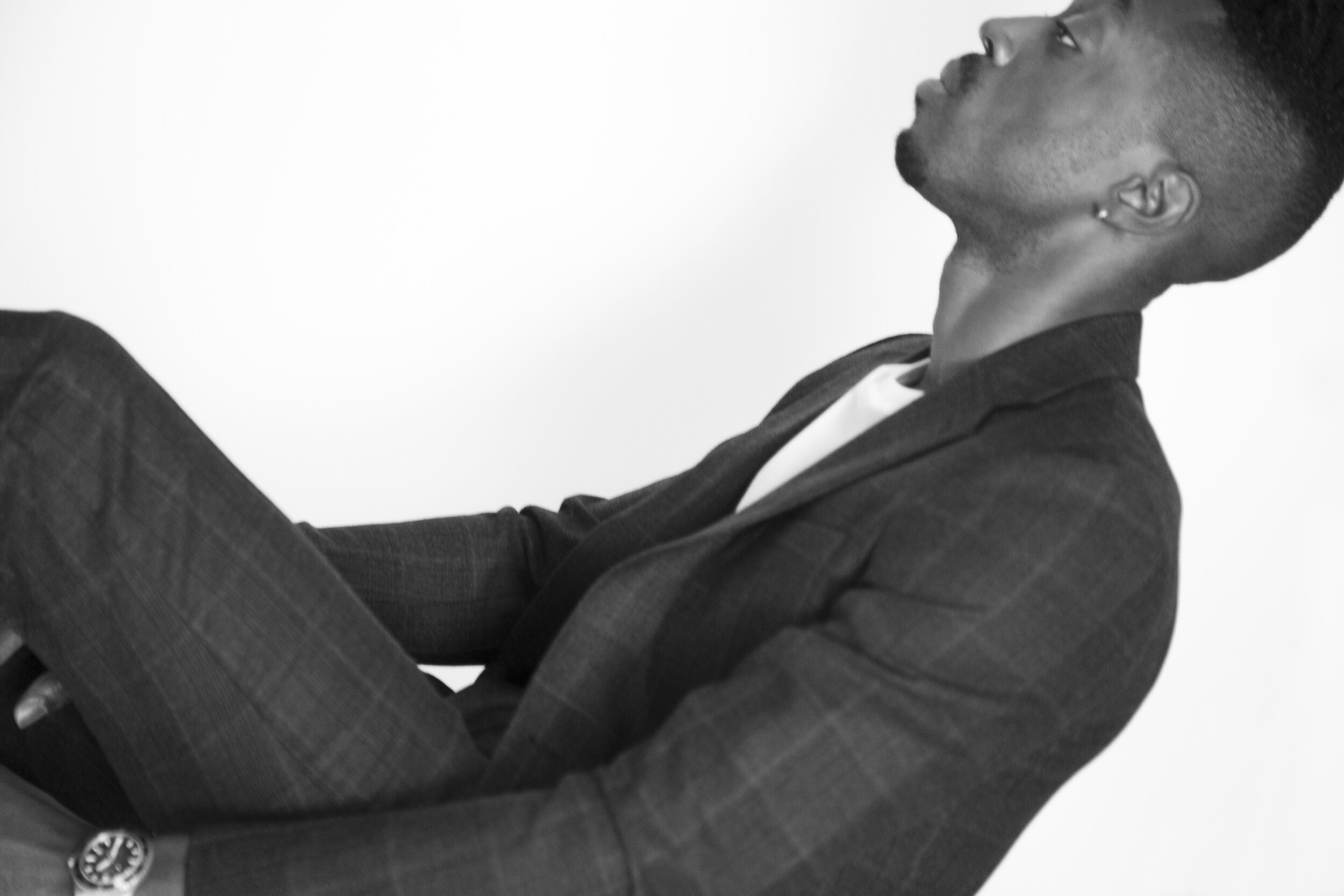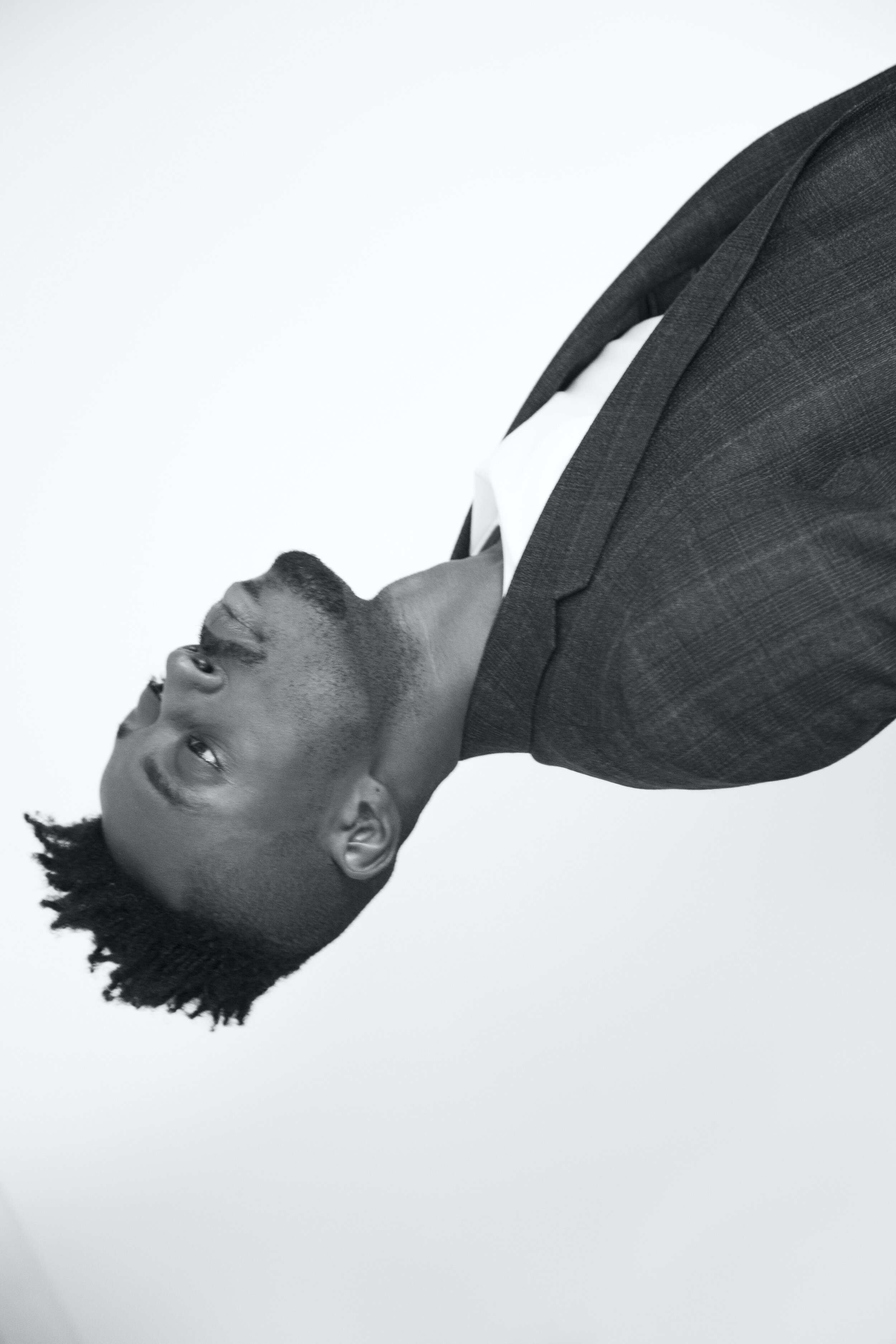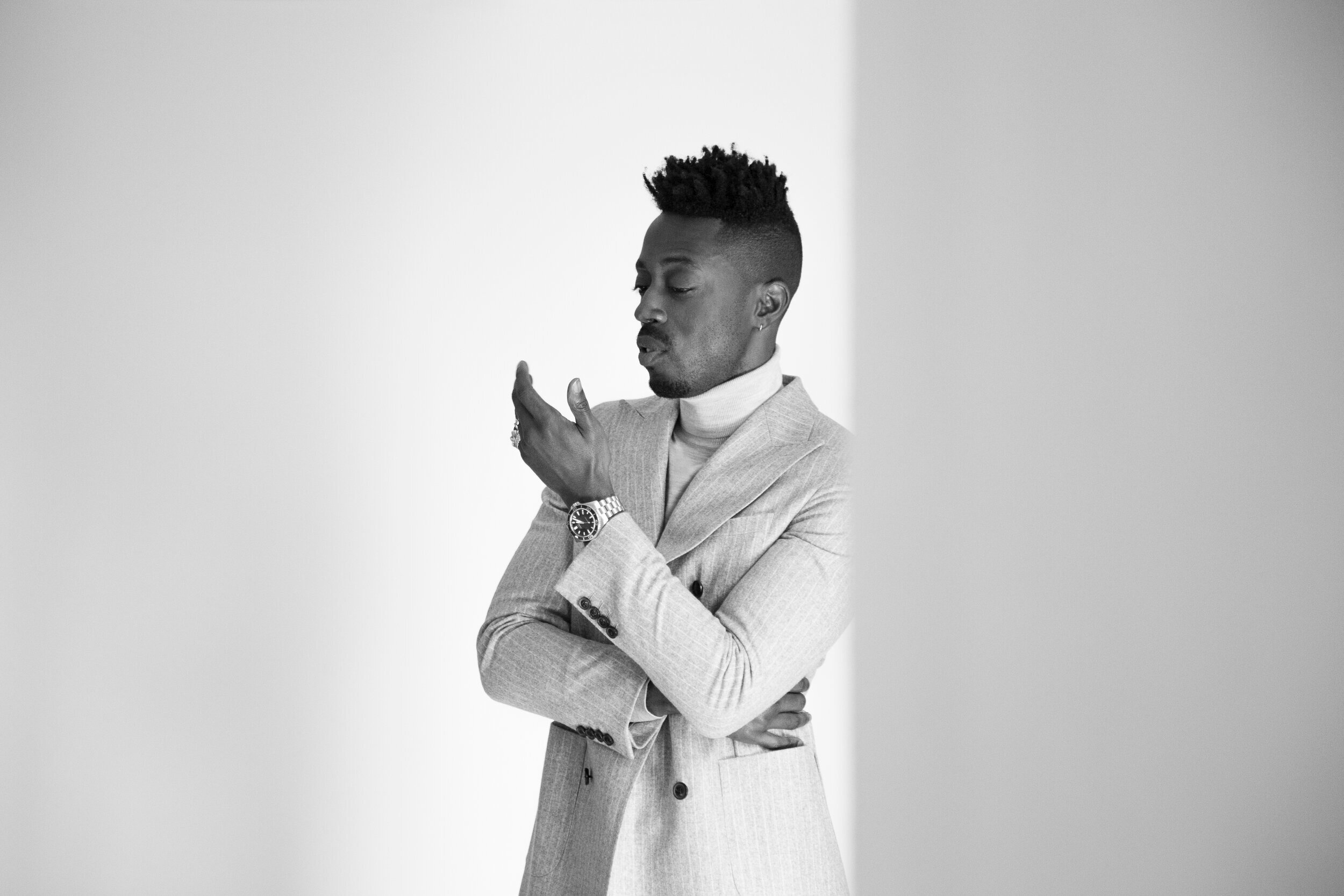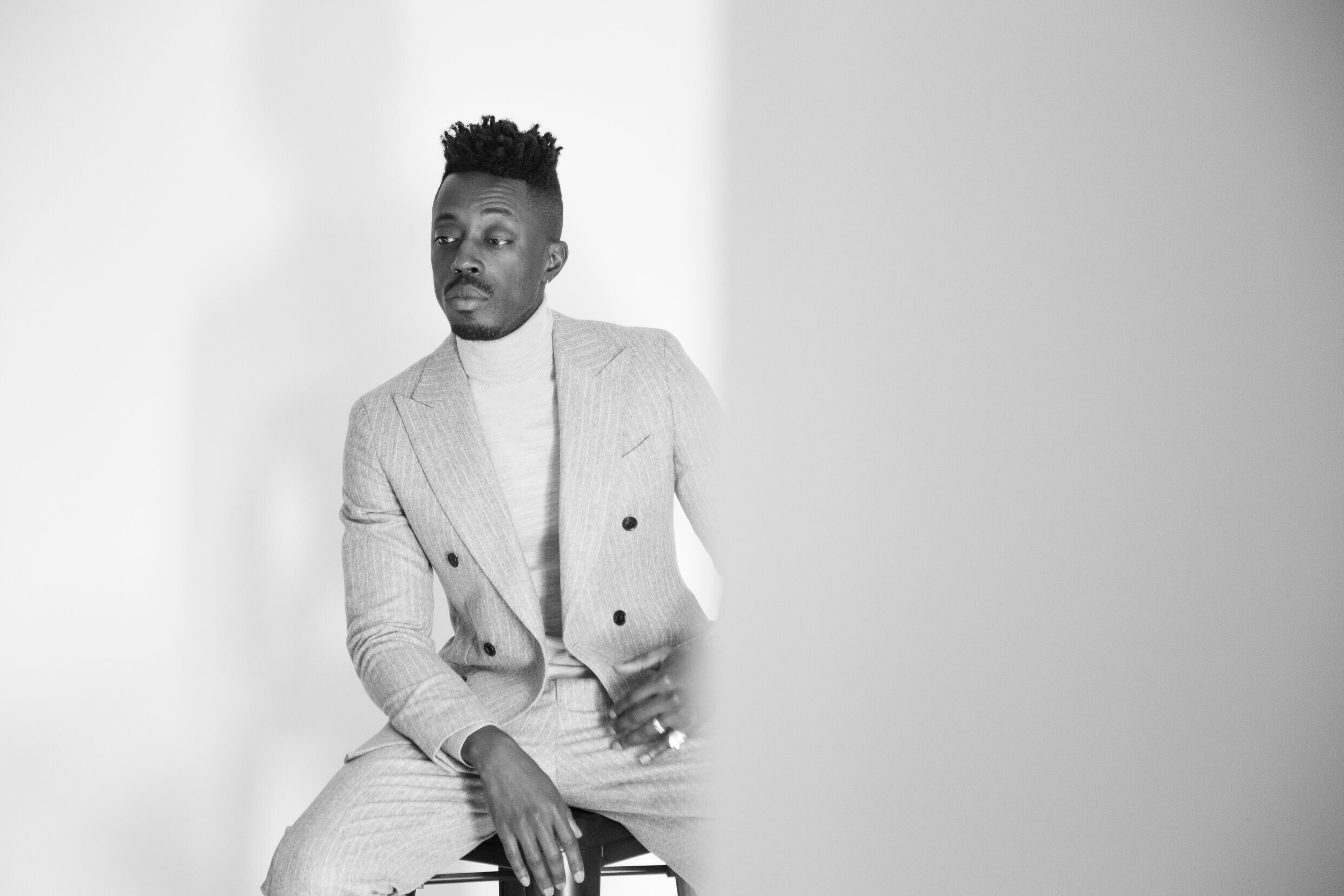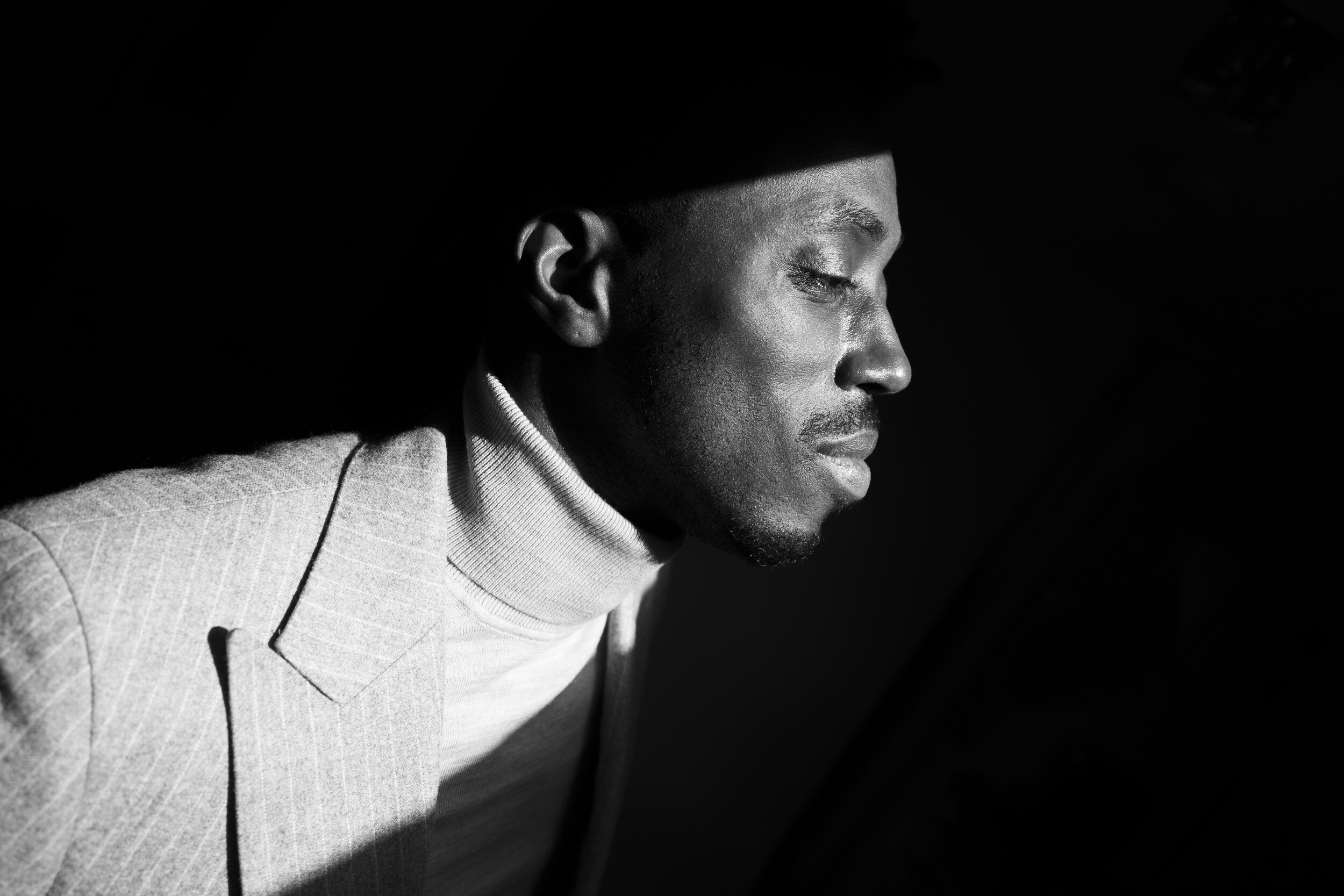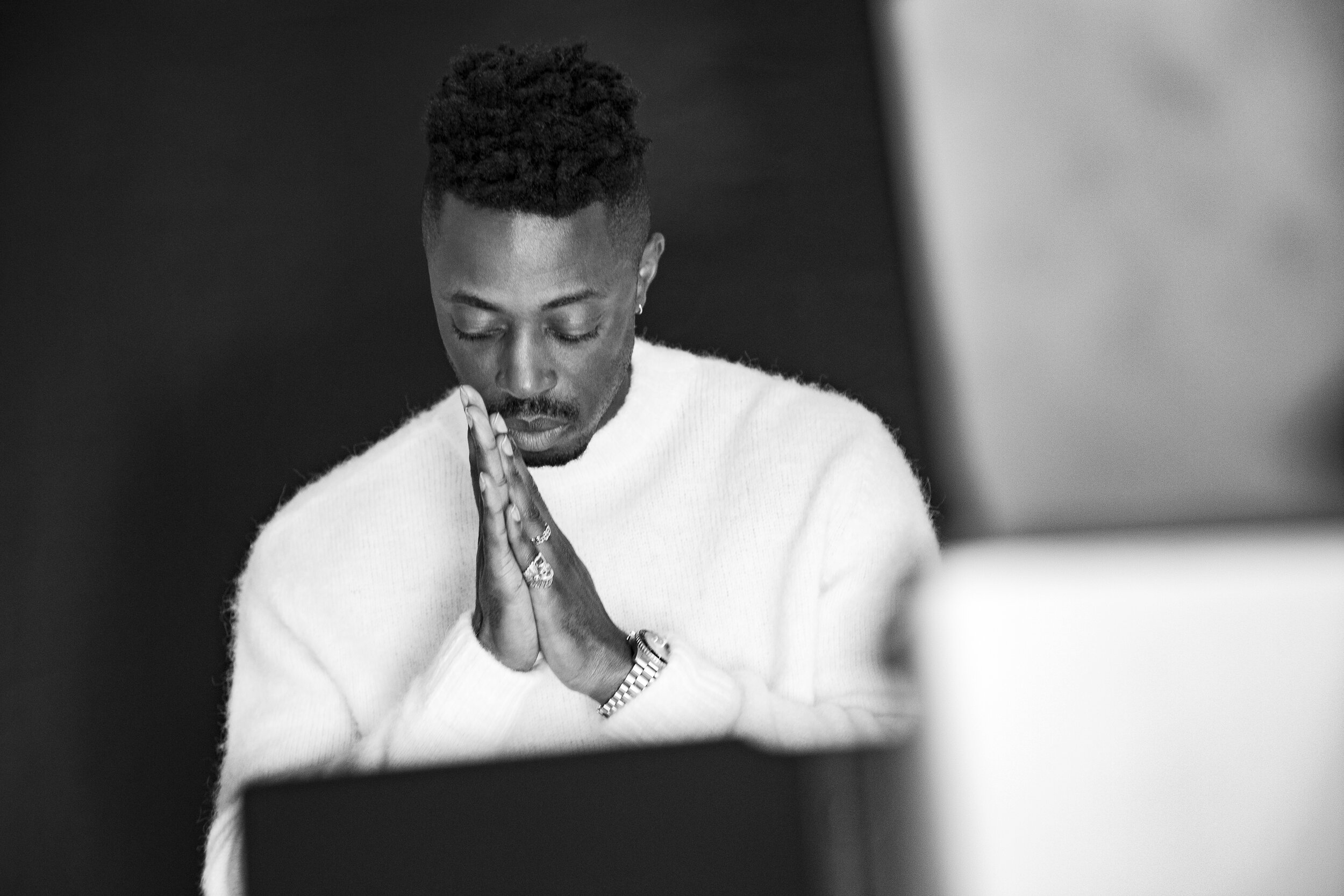British Actor, Edwin De La Renta On 'The Informer' And Social Responsibility Within The Film Industry
WITH EDWIN DE LA RENTA
Each role brings a new world to unravel as Edwin De La Renta gets into character.
Photography, Kirk Truman
Words, Caleb Church In Conversation with Edwin De La Renta
VIEW GALLERY
Real - A word that could easily used to describe Edwin De La Renta. Energetic, friendly, and wrapped in an air of warmth.
Born and raised in London, Edwin studied at the Sylvia Young Theater School, before moving on to Goldsmiths University where he earned his degree in sociology.
Naturally drawn to the license of trying as many things as possible, Edwin transitioned into acting starting fairly 7 years ago. The simple reason of cultural enlightenment through film is what brings Edwin contentment. With each role comes a whole new world to unravel when he gets into character and this reason summarizes his sustained interest in the industry. “Often you’re learning about a whole different occupation if it’s steeped in realism,” he says, “Or even if it’s not, there’s still going to be some kind of impact from new information that you’re taking on.”
Having starred next to renowned actors like Steven Berkoff, Common, and Rosamund Pike, Edwin’s pursuit for artistic excellence stays on sight - on and off camera.
I choose to use my platform to speak on things that I believe in but I'm not gonna hold everyone to my standards.
Ahead of the U.S. release of his latest film, The Informer on Nov 6th on PVOD, I was able to engage the lifetime Londoner in a conversation on current events.
Transitioning into topics across his personal and professional life from the global pandemic, to the Black Lives Matter movement, our friendly conversation bears a positive outlook on troubling times.
THE LOOK
Suit - Rollneck Sweater, REISS; Wrist Watch, Rolex
BO: In light of current times, how has the actor life changed? Are you back on set, or auditioning?
ED: I had three movies out last year. One was a film called The Informer with Common, Rosamund Pike, Joel Kinnaman, and Clive Owen. It’s a thriller set, half in the prison, and half in New York. It follows this ex-special forces soldier who gets brought in by the FBI to go on an underground mission and it all goes wrong.
That was fun because I got to work with people like Common, who’s amazing. He was very giving on set. They were all very giving on set, and that was quite a nice environment to be in.
Then I shot a movie called Bharat that was a foreign language film in India. I’d always wanted to do a foreign language film, but I don’t really speak any other languages. I landed this role and it was great! We were shooting out in Malta, in the mediterranean for a few weeks. There’s this really really huge action sequence with Morgan Chase. My character is the lead of a band of pirates who hijack this huge freight liner. The film did really well in Asia, and it has given me a bit of a fan base out there which is nice.
Now, I’m just back. Just auditioning, but it’s been quite busy.
BO: What would you have seen yourself doing if you hadn’t ended up acting?
ED: I don’t know. I think the reason I started acting is because you can do so many different things. I was like “Yo, I can do that, and then put that down”. You can go be a lawyer and then put that down. Every role is learning. Often, you’re learning about a whole different occupation if it’s steeped in realism. Or even if it’s not, there’s still going to be some kind of impact from new information that you’re taking on. It’s a bit of a hard question to answer.
BO: Absolutely! You have to be specifically careful these days when you get into a role that reflects something sensitive too, like a mental health issue.
ED: Totally! I had a few projects out last year, and one of them was based in a prison. So, I did loads of research on the prison system in America. It was just like “wow” – really informative. There’s loads of documentaries on things like that.
We need to make sets more inclusive. People should be able to see themselves represented in all aspects of the set.
THE LOOK
Wrist Watch, Rolex; Suit, REISS
BO: What role has been the hardest for you to get into character for?
ED: I did a movie last year called The Last Faust with Steven Berkoff who’s a baddie in so many movies, and he’s a classically trained theater actor. In the film, I played his robot assistant - an android essentially. I had to be super still for the entire shoot, very aware of facial muscles and moving as minimally as possible. All to replicate that robotic movement.
In terms of difficulty, I would say that was it because there was a lot of physicality to it. Like not blinking during your performance. You don’t realize how much we blink as humans. Especially when you have all those lights on you and shit like that. After every take I would be like “Damn man”.
BO: What is your take on the increased pressure for social responsibility put on actors from the public?
ED: Well, having a platform certainly means that you have the power to influence & reach a wide demographic. I definitely think it’s a useful tool to use to spread positivity, get messages and points across regarding causes that you personally believe in. However, if artists don’t want to speak on issues they shouldn't feel forced to do so, just because they have said platform. If you don't feel politically savvy enough to join a debate then, don't. Most aren't. If you feel that you’re gonna say something foolish then say nothing. Cancel culture is real and things often get lost in translation. The bottom line is be true to yourself, if you feel the need to speak up then do so and let it be organic. This year has been a testing time for everyone across the globe and everyone has something valid to say. Personally, I choose to use my platform to speak on things that I believe in and support movements that I feel the need support, but I'm not gonna hold everyone to my standards.
BO: In the current political climate of the industry, we’re increasingly aware of our media, who’s represented, and where. We’ve even gone as far as to see major actors leaving roles because they didn’t fit a role enough.
ED: I think I started seeing it as early as last year when breakdowns and scripts would come in. To be honest, last year I got so many scripts where I was like “wow, they want to see me for this?”
Just things that would have previously been seen with a predominantly white cast. These are all things that have been rebutted. I’m not going to say anything particular, but a lot of things.
There has been a shift compared to when back in the day agents or casting directors would get breakdowns from studios and they would be like “okay, lead guy is blonde/Caucasian”. Now, it’s anybody. There isn’t a focus on the casting in that way. So, that’s positive!
BO: Where do you feel like that push in the industry is coming from, internally speaking?
ED: A lot of things. Copyists go by it, the Oscars go by it. So, a lot of important people in the industry are taking notice. Having these sorts of movements supported by actors, A list actors, really helps the change. People know that if they put out something, people are going to be like “there’s not enough black people, or women, or trans people on these sets”.
We need to make sets more inclusive. People should be able to see themselves represented in all aspects of the set. My partner and I had a conversation about this the other day where we tried to think of how many casting directors of color we knew. In the U.K. here, anyway, we were able to name about 3 or 4. There’s not a lot.
BO: How do you feel the community as a whole has responded to these changes in the industry? A lot of people have the mentality that there’s only so much pie to go around. So, I imagine there must be friction.
ED: For sure, there will always be friction. We’re habitual creatures and we’re used to things. People are always going to feel threatened by changes because they’re going to say “Well, if this changes there’s going to be less for me” or they’re going to think they have less of a change because of this. There’s nothing to be worried about. The world is constantly changing. You shouldn’t be scared of change.
I saw something the other day about the academy possibly changing the way that the best picture nominees are selected, and I saw a couple of actors who were saying they didn’t think that was right. Everyone is entitled to their opinion. As long as it’s beneficial, and done correctly.
BO: What does “done correctly” mean to you?
ED: If someone is writing a story on indigenous peoples of America, of course they’re probably going to want someone who’s indigenous to tell the story. Do you know what I mean? I think production companies and studios need to look for people who can tell those stories or are more in tune with it.
That’s not to say that if you’re not from that background, you can’t tell that story. For instance, there’s a lot of black British actors who’ve said things like “Don’t you think that story would have been better if it was told by someone who was from here”. I’m like, we all experience the same struggle, wherever we are.
BO: We saw a huge controversy with that in the case of Annie. To me, there’s a line in the sand almost when it goes from reality to fiction. Tell me if you agree or disagree but, for me, if it’s fiction, I don’t put so much importance on who’s telling the story.
ED: 100%. If you want to have Kevin Jon play as Annie, who cares? It’s not real. It doesn't make any kind of a difference. I don’t get it. Why are you going to worry about POC being in fantasies? So, I think definitely there. However, if you did a biopic, and you want to keep it true to form, by all means make sure the people you’re hiring look like the people that you’re representing.
Also, we don’t want it to be so stringent to the point where we’re doing a biopic on someone from the Deep South, so you have to pick someone from the Deep South. It’s like, we’re actors, we should be allowed to transform. Within reason, you know? I’m not going to white-up and try to do a George W. Bush. I’m not a Bush impressionist.
BO: Do you see this controversy within the film industry, or more on the audience side?
ED: I think it’s more on the audience side. I think that most actors, even if they’re quiet, they will say “No, I think this should be different.” Some Actors understand it from the perspective of when you train or are in the theater, there’s a lot of cross color cast. I mean look at Hamilton.
We’ve seen a lot of injustice in all areas, so people aren’t going to be quiet.
THE LOOK
Sweater, American Vintage
BO: How do you feel the Black Lives Matter movement has specifically infiltrated the industry?
ED: You know, the main theme around the Black Lives Matter movement is the injustice of the treatment of black people, and how these injustices are dealt with. We’ve seen a lot of injustice in all areas, so people aren’t going to be quiet. They’re not just going to sit there and say “okay, yeah. That’s happened.” You can whip out your camera phone and just film anything.
I think we’re going to see a lot more movies highlighting injustices. You know, some people say why do the movies have to get political. All movies are political. Even Marvel movies are political. Of course we go to the movies to escape, but we also go to the movies to learn.
BO: How has the Black Lives Matter movement impacted your acting career?
ED: I have friends who are writing so many stories. A lot of this injustice is swept under the carpet. They need to be highlighted, because people always think that it’s just one group of people. They think it’s criminals or people who deserve it. No, this stuff is happening to different people.
THE LOOK:
His Own Jewelry
BO: On a lighter note, what kind of films do you see yourself making in the near future?
ED: I think that my preferred genre, actually, is emotionally driven drama, but I do like action. Stories about families/dysfunctional families, I love that stuff.
I feel it just tells you a lot about the human struggle that’s not spoken about. You know people put on a front, but when you get home, I think that your household really knows who you are. People relate to them, you know?
Action movies make for great escapism. I think film can be so many things. If I sit down to watch an action movie, I know that I’m looking to escape into something. Maybe something a little fun. However, often, I like to be moved by real human experiences.
BO: What advice would you give to upcoming black talent like yourself?
ED: Well, one. I’d say perseverance. Enjoy it. Know that if it feels like work, you’re not doing it right, and just keep working on your craft. This game is like being an athlete. You have to be like an athlete. Keep training. Just keep training.
Also, learn about the industry, like the business side. Learn about how things are made. I meet young actors all the time and they don’t even know what makes a good agent. Of course, there’s a lot of agent who can’t actually do that much. There’s a lot of actors who have their career stagnated because they sign the wrong agent.

